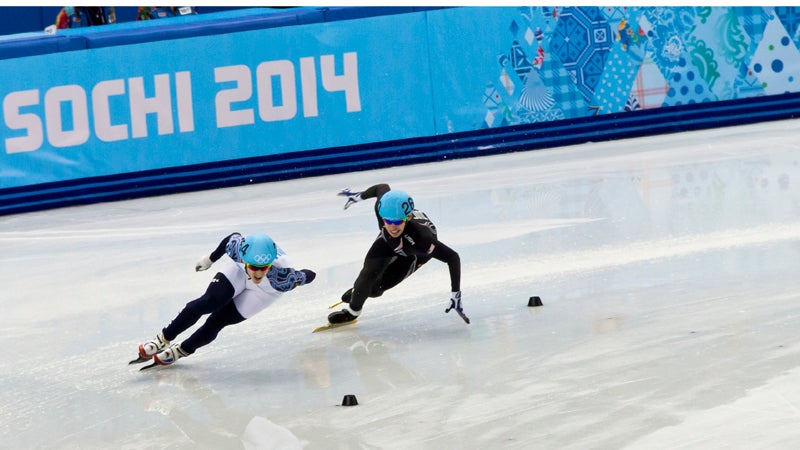Everyone knows U.S. speedskaters did not perform well in Sochi. The long track team failed to bring home any Olympic medals for the first time in 30 years, prompting U.S. Speedskating to investigate what went wrong.
The , released earlier this month, blamed training errors for the poor showing Three national coaches after this year’s Olympic games, including all-round coach Kip Carpenter, sprint coach Ryan Shimabukuro, and short-track coach Stephen Gough. The high-performance director, Finn Halvorsen, resigned.*
So we asked the coach of 2010 and 2014 Olympian, Brian Hansen, and four-time Olympic speedskater herself, , to break down what happened so athletes from all sports can learn from speedskating’s mistakes.
Forget About Altitude
The problem: U.S. Speedskaters spent 10 days before the Olympics training at altitude in Collalbo, Italy, then left for Sochi two weeks before their first races. The idea behind altitude training is that it will make the body produce more oxygen-carrying red blood cells that will improve an athlete’s endurance at sea level. But it can also have drawbacks.
“There is a fatiguing factor in dealing with altitude,” Swider-Peltz says. “You can never go super hard.” Also, it can be difficult to maximize altitude’s beneficial effects. “You have to be very calculated,” she says. That’s where it’s helpful to have a coach who can read your fatigue and adjust your training plan accordingly.
The fix: Athletes in shorter, technical sports might want to ditch the mountains. “I don’t think you have to train at altitude to be successful,” Swider-Peltz says. “It’s better to work on the things—the little nuances that can produce that tenth of a second—than to work so hard adjusting to altitude.”
Get Lazy to Stay Off Your Feet
The problem: “Two weeks before the first race, we were up at four or five in the morning to take a bus ride to Munich. Then we walked around for four or five hours, then we went to the BMW dinner and were up ‘till midnight,” Swider-Peltz says. “Then you get up at four o’clock in the morning and travel to Sochi where the transportation isn’t quite settled and you have to walk a lot.” As a result of the intense travel schedule, athletes were physically and mentally drained.
The fix: Athletes should be prepared to take a few hits before a race, Swider-Peltz says, whether that’s an unexpected late-night out, or a hitch in travel arrangements. But take too many hits right before a race, and your performance may suffer. So do your best to save the sightseeing and socializing for after your event.
Test Everything in Advance
The problem: As the reported, the executive director of U.S. Speedskating said, “the team erred in its decision not to use the brand-new Mach 39 suits in competition before the Olympics, as well as a skate polish that the team introduced on the eve of the Games.”
Swider-Peltz says U.S. athletes were asked to make decisions about the suits, skate polish, and kinesiology tape while at the outdoor track in Collalbo just before the Games. “But [the athletes] were cold, they had to change their technique to deal with the wind and the cold,” Swider-Peltz said, making it difficult for athletes to determine if they felt the new equipment was helpful or not. Asking the athletes to “to decide if something was good or different, or if it was the polish or the uniform” three weeks before the Games, she says, “messed with the athletes’ minds.”
The fix: “In my opinion, you should test things six weeks before to determine if they’re good or not good,” Swider-Peltz says. Once you’ve figured out your ideal equipment setup—and you know it’s quick, and comfortable—you’ll feel confident and fast on race day.
Bonus tip: Vet your coach and team
“If you’re going to be a part of a team, it’s just like a marriage,” Swider-Peltz says. “Make sure you wholeheartedly respect the leader. Also, make sure you like the other people on the team, because that is going to affect your ability to like what you’re doing. If you’re distracted by the other people, that’s going to be detrimental to your development.”
*Clarification: We updated the language of this paragraph to make it clear that Kip Carpenter, Ryan Shimabukuro, and Stephen Gough Shimabukuro left U.S. Speedskating but were not forced to resign.


